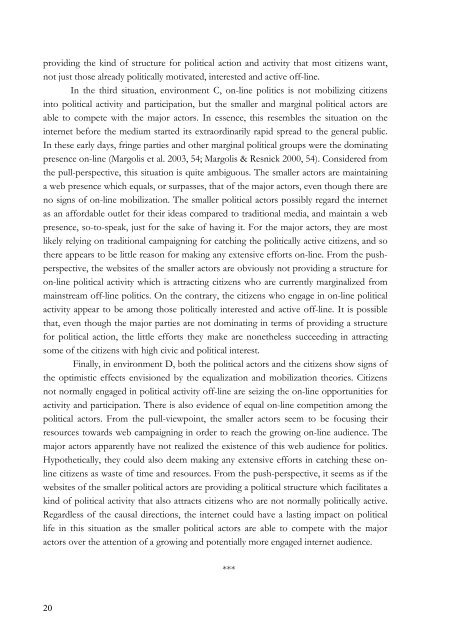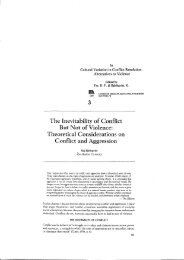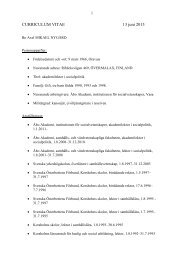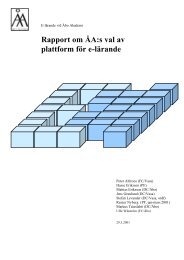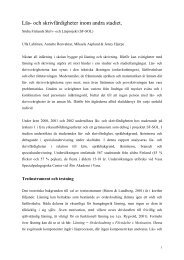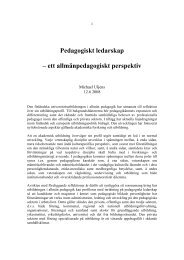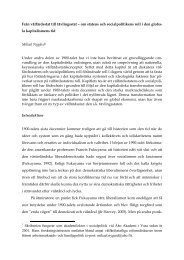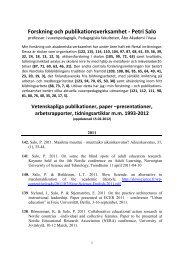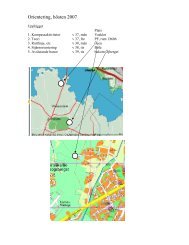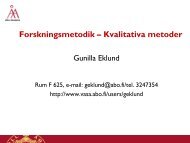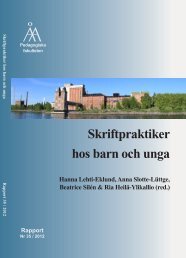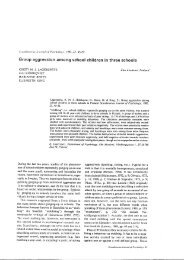Parties, Candidates and Citizens On-Line - Åbo Akademi
Parties, Candidates and Citizens On-Line - Åbo Akademi
Parties, Candidates and Citizens On-Line - Åbo Akademi
Create successful ePaper yourself
Turn your PDF publications into a flip-book with our unique Google optimized e-Paper software.
providing the kind of structure for political action <strong>and</strong> activity that most citizens want,<br />
not just those already politically motivated, interested <strong>and</strong> active off-line.<br />
In the third situation, environment C, on-line politics is not mobilizing citizens<br />
into political activity <strong>and</strong> participation, but the smaller <strong>and</strong> marginal political actors are<br />
able to compete with the major actors. In essence, this resembles the situation on the<br />
internet before the medium started its extraordinarily rapid spread to the general public.<br />
In these early days, fringe parties <strong>and</strong> other marginal political groups were the dominating<br />
presence on-line (Margolis et al. 2003, 54; Margolis & Resnick 2000, 54). Considered from<br />
the pull-perspective, this situation is quite ambiguous. The smaller actors are maintaining<br />
a web presence which equals, or surpasses, that of the major actors, even though there are<br />
no signs of on-line mobilization. The smaller political actors possibly regard the internet<br />
as an affordable outlet for their ideas compared to traditional media, <strong>and</strong> maintain a web<br />
presence, so-to-speak, just for the sake of having it. For the major actors, they are most<br />
likely relying on traditional campaigning for catching the politically active citizens, <strong>and</strong> so<br />
there appears to be little reason for making any extensive efforts on-line. From the pushperspective,<br />
the websites of the smaller actors are obviously not providing a structure for<br />
on-line political activity which is attracting citizens who are currently marginalized from<br />
mainstream off-line politics. <strong>On</strong> the contrary, the citizens who engage in on-line political<br />
activity appear to be among those politically interested <strong>and</strong> active off-line. It is possible<br />
that, even though the major parties are not dominating in terms of providing a structure<br />
for political action, the little efforts they make are nonetheless succeeding in attracting<br />
some of the citizens with high civic <strong>and</strong> political interest.<br />
Finally, in environment D, both the political actors <strong>and</strong> the citizens show signs of<br />
the optimistic effects envisioned by the equalization <strong>and</strong> mobilization theories. <strong>Citizens</strong><br />
not normally engaged in political activity off-line are seizing the on-line opportunities for<br />
activity <strong>and</strong> participation. There is also evidence of equal on-line competition among the<br />
political actors. From the pull-viewpoint, the smaller actors seem to be focusing their<br />
resources towards web campaigning in order to reach the growing on-line audience. The<br />
major actors apparently have not realized the existence of this web audience for politics.<br />
Hypothetically, they could also deem making any extensive efforts in catching these online<br />
citizens as waste of time <strong>and</strong> resources. From the push-perspective, it seems as if the<br />
websites of the smaller political actors are providing a political structure which facilitates a<br />
kind of political activity that also attracts citizens who are not normally politically active.<br />
Regardless of the causal directions, the internet could have a lasting impact on political<br />
life in this situation as the smaller political actors are able to compete with the major<br />
actors over the attention of a growing <strong>and</strong> potentially more engaged internet audience.<br />
20<br />
***


